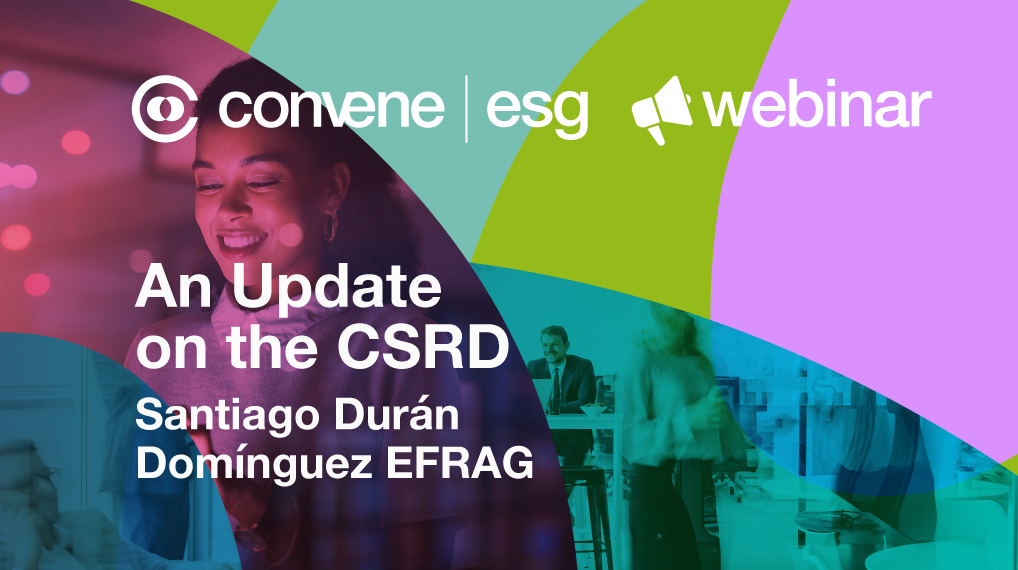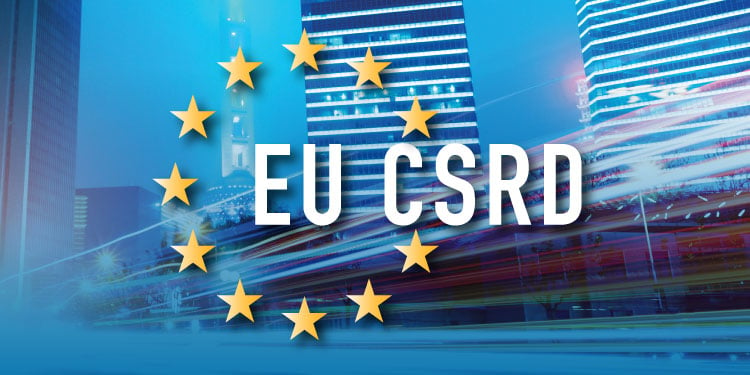With the implementation of the Corporate Sustainability Reporting Directive (CSRD) in January 2024, the adoption of the European Sustainability Reporting Standards (ESRS) has become mandatory for companies within its scope. This marks a significant step towards standardised non-financial reporting across Europe.
2 min read
Demystifying ESG in the EU - Webinar
By Lottie Wright on 17/04/24 10:56
On the 16th April 2024, Convene hosted our second webinar in our Convene ESG series, which focused on ‘Demystifying ESG in the EU’.
The webinar featured Professor Laura Corazza, a Senior Researcher of Sustainability Accounting and Accountability at the University of Turin. In her talk and presentation she explained the new EU CSRD Regulations, before going through some practical tips on how companies can start embracing ESG principles.
Laura Corazzo first spoke about the ESG regulatory landscape, and how disclosures have transformed over the years. She looked at the international reporting landscape specifically, and explained the difference between standards and frameworks.
Laura discussed the European strategy towards sustainability with the European Green Deal, and highlighted the targets, time frames and actions of said deal.
Then Laura explored how the European ESG landscape has been transforming in recent years, starting with the European Taxonomy and its objectives. She spoke about the changes occurring to global economies including the implementation of the CSRD, the DNSH principle and the CSDDD.
She then gave some background information surrounding the CSRD, and the differences between the previous NFRD legislation and the current CSRD. The CSRD has far more detail in regards to the data that companies need to provide in their reporting.
Laura then introduced the CSRD timeline and phased implementation, noting that from January 1st 2024 reporting requirements apply to the first group of affected companies, with their reports being published in 2025. She ended the talk discussing double materiality and its logic.
To download the slides from Laura's talk, click here. Or scroll below to watch Laura's talk.
Topics: Sustainability ESG Frameworks Webinars
2 min read
An Update on the CSRD with Santiago Durán Domínguez - Webinar
By Lottie Wright on 15/03/24 09:46
On the 12th March, Convene hosted the first webinar in our Convene ESG series, explaining updates on ESG matters in the EU.
This webinar discussed an update on the CSRD, with Santiago Durán Domínguez from EFRAG. The CSRD, or Corporate Sustainability Reporting Directive, is the new EU legislation requiring companies to release regular reports on their ESG efforts.
First, the webinar started with a demo on reporting for the CSRD with Convene ESG, Convene’s own ESG reporting software. Convene ESG is an end-to-end platform to collect data, track progress, compare with peers, align with frameworks and produce ESG reports. With Convene ESG, you can collect your data for all the necessary metrics in the upcoming CSRD legislation, ensuring that you are compliant with regulations.
Then, Santiago Durán Domínguez was introduced to talk about the update to the CSRD. He discussed the sustainability information organisations should know about, and the current areas of regulatory developments; taxonomy, tools for companies and disclosure regimes.
He discussed the relevant aspects of the CSRD, and stressed the importance of the CSRD as a way for companies to all report according to European standards.
Santiago Durán Domínguez also went through the three categories of standards for the CSRD, and discussed the relevant issues of double materiality, due diligence, interoperability with other international frameworks and value chain.
He then spoke about the role of EFRAG in all of this, and the current issues of verification with the CSRD, which will instead have limited assurance until 2028. There was then a brief Q&A at the end of the session.
To download the slides from Santiago's talk, click here. Or scroll below to watch Santiago's talk.
If you enjoyed this webinar or want to catch the next one, our upcoming topic will be ‘Demystifying ESG in the EU’ on April 9th.
Thank you to all for those who attended, and to Santiago Durán Domínguez for his insights into the CSRD.
Topics: Sustainability ESG Frameworks
6 min read
What to Prepare for 2024: Housing ESG
By Lottie Wright on 01/12/23 10:30
With the increasing focus on ESG in recent years, it's important to feel prepared for what this changing landscape can bring in the future.
For Housing Associations, the Prime Minister’s announcement of a policy overhaul on plans to help cut carbon emissions left the sector in limbo, and the recent appointment of a new housing minister, the 7th since the beginning of 2022, means that regaining a sense of stability is more critical than ever.
Staying ahead of trends, pushing ESG discussions forward and focusing on developing an effective reporting cycle will be crucial in helping Housing Associations feel secure in the face of future uncertainty.
Housing Associations need to be on top of their ESG reporting, and this includes choosing the right framework and solutions for your organisation.
Topics: Sustainability ESG Housing Frameworks
6 min read
What is the ISSB?
By Lottie Wright on 25/10/23 13:24
The International Sustainability Standards Board (ISSB) standards are set to become effective starting January 1, 2024. These new standards are a significant step forward for sustainability reporting. They will have a major impact on the way companies disclose their ESG (Environmental, Social, Governance) initiatives.
One major challenge that companies face when it comes to ESG reporting is the lack of standardisation.
There is currently a lot of freedom in what companies can disclose, because there is no global standard for reporting. As a result, they have the ability to present reports in a way that benefits them the most. This not only lacks scientific validity but also opens the door to greenwashing.
The ISSB standards are intended to be the foundation for a comprehensive global baseline of sustainability disclosures. They are specifically focused on the needs of investors and the financial markets — something investors have long desired.
So, what do you need to know about this next phase of evolution in ESG reporting?
What is the ISSB?
The International Sustainability Standards Board (ISSB) is an independent, private-sector body that develops and approves IFRS Sustainability Disclosure Standards. The ISSB operates under the oversight of the IFRS Foundation.
Today, economic and investment decisions are increasingly incorporating sustainability information. In response to this, the IFRS Foundation created the ISSB as a sister board to the IASB in 2021. The ISSB provides a global baseline of sustainability disclosures to further inform economic and investment decisions.
There are two sets of proposed standards under the ISSB – sustainability related disclosures and climate disclosures. Both of these are structured around the four pillars outlined by the TCFD: governance, strategy, risk management, metrics and targets.
General sustainability disclosures:
The ISSB extends the framework established by the Task Force on Climate-related Financial Disclosures (TCFD). This means the framework now encompasses non-climate-related sustainability issues. Additionally, these standards outline intentions to disclose all potential risks and opportunities relating to sustainability matters.
Climate disclosure standards:
These standards are primarily focused on climate-related aspects, aligning with the TCFD approach. They tackle important factors including potential risks to the environment, climate resilience, greenhouse gas emissions, and carbon footprint.
The governance and risk management pillars of the ISSB are closely aligned with the TCFD's recommendations. However, this new standard calls for further information and more details on strategy, metrics and targets.
After extensive consultation and feedback since the start of the standards’ development, and with the two proposed standards having been announced, the ISSB will come into force in January 2024 for the subsequent reporting year.
What is the ISSB’s purpose?
Given the number of ESG standards that already exist, it might leave companies wondering what the ISSB is even supposed to achieve.
The ISSB is designed to address this developing disclosure fatigue. By continuing a process of consolidation in sustainability standards, it seeks to create a global standard for ESG reporting.
The ISSB has set out four objectives:
Topics: Governance Sustainability ESG Frameworks
4 min read
What are the current ESG Regulations in the UK?
By Lottie Wright on 27/09/23 16:02
In recent years, a growing number of ESG (environmental, social, and governance) regulations have been passed around the globe.
More and more companies are being asked by investors to disclose their data, and more regulations are coming in full force. For institutions in the UK, it seems as if mandatory disclosures are just around the corner.
It is important to understand how regulations could affect your business, and to be prepared to start collecting, analysing and reporting on your ESG practices.
What are ESG Regulations?
ESG regulations are a set of requirements placed on an organisation to publicly disclose information about their ESG performance.
Although environmental, social, and governance (ESG) concerns have recently become a focus, the regulation surrounding these matters is even more current. Adhering to ever-changing regulations poses a difficulty, particularly for organisations in the early stages of developing their ESG reporting initiatives.
ESG regulations vary by country, and staying informed, as well as compliant, of these differences is crucial for companies doing business abroad.
The repercussions of non-compliance can be staggering. This can include large fines, a loss of public trust through poor publicity and, ultimately, an impact on revenue. It’s time to start understanding how ESG regulations might affect your organisation.
What are the current UK regulations?
At present, the UK has no single ESG law or regulation. The UK’s ESG policy consists of domestic and EU-derived laws and regulations, many of which are not ESG-focused.
However, one key regulation for ESG disclosures in the UK that does exist is the Companies Act. It includes requirements for annual reporting, and this applies to larger companies that are listed, have more than 500 employees or exceed £500 million in annual turnover.
Non-financial information has always been a requirement of these reports but the Act was extended in 2022 to include sustainability details. Large UK companies are now required to report on energy usage and carbon emissions as part of their annual reports.
Some sectors and organisations of a certain size now have standards they may have to report against. For example, the Housing sector has the Sustainability Reporting Standard, which whilst currently optional is paving the way for industries to specialise and standardise their ESG Reports.
Additionally, starting in 2023, ESG reporting in the UK will be further defined through Sustainability Disclosure Requirements (SDRs). The SDRs offer a framework for companies to handle sustainability opportunities, potential risks, and effects, while also establishing measurable goals and objectives.
While the SDRs are rolled out over the next two years, fully mandatory disclosure is expected by 2025.
For financial years starting after 6 April 2022, TCFD based reporting will be mandated for more than 1,300 of the largest UK-registered companies and financial institutions.
This encompasses numerous major publicly traded corporations, financial institutions, and insurance companies in the UK. Additionally, sizeable private companies are also subject to the new regulations.
New legislation affects not just large companies and institutions in the UK, but also the businesses that are in their supply chains. This emphasises the need to start reporting on ESG matters, regardless of whether you are directly impacted or not.
What are the future ESG Regulations?
Other developments in ESG reporting expected over the coming year include a mandatory requirement for certain companies to publish "net zero transition plans". These should outline how they will adapt as the UK moves towards a low carbon economy by 2050.
It is also worth noting that European corporate sustainability reporting requirements may well impact non-EU companies in the future. If they have significant EU activity or fall within the value chain of an in-scope EU company, they could be affected.
The new CSRD requirements mandate that both private and public EU companies provide detailed information on sustainability-related issues. This also applies to any non-EU companies with a substantial presence in Europe.
The International Sustainability Standards Board (ISSB) released its exposure drafts on 31 March 2022 with comments to be received by 29 July 2022. The proposed guidelines establish the criteria for disclosing information on climate and overall ESG reporting. They are likely to be implemented into UK legislation by 2024 or 2025.
While ESG reporting requirements are rapidly expanding, these regulations mostly build on existing reporting frameworks, such as the TCFD.
Although not all companies are subject to these regulations, there is a growing demand from investors for reporting. Therefore, businesses can anticipate this evolving scenario by embracing the best practices of ESG reporting without delay.
How Convene Can Help With Your ESG Reporting
Here at Convene we have developed our own ESG reporting tool: Convene ESG.
Our aim is to alleviate some of the challenges of ESG data gathering, performance tracking, and reporting for ESG factors so organisations can move towards global sustainability and net zero.
Designed in collaboration with our clients, Convene makes reporting simple, so you can focus on developing sustainable strategies.
Convene ESG can help you report on a range of existing standards including the TCFD, GRI, SRS, amongst a range of others.
It also has a built-in comparison feature, which allows you to compare against competitors' formatting of their publicly accessible reports. This will help your organisation develop the best results possible.
It's important to understand the ESG landscape and its regulations, even before these regulations are mandatory, so you can be prepared to face ESG disclosures head on. It helps not only your organisation, but the planet, to focus on how you can improve ESG practices.
Topics: Governance Sustainability ESG Frameworks
6 min read
Che cosa è la CSRD?
By Lottie Wright on 23/08/23 14:41
Nei prossimi anni l'UE introdurrà una legislazione più rigorosa in materia di ESG, sia per le grandi aziende che per le PMI, che dovranno presentare relazioni. È fondamentale che la vostra organizzazione anticipi queste normative e riduca l'impatto negativo implementando strategie di monitoraggio, raccolta dati e reporting accurate. Porre l'ESG in cima alla vostra agenda vi offre un vantaggio rispetto alle aziende che non hanno ancora alcun obbligo di rendicontazione quando si tratta di conformarsi ai quadri normativi esistenti e a quelli nuovi, nonché di attrarre finanziamenti sostenibili e di compiacere gli stakeholder.
La Corporate Sustainability Reporting Directive (CSRD) è la nuova normativa dell'UE che impone alle aziende di pubblicare regolarmente rapporti sulle loro attività ESG. È stata concepita per incoraggiare le aziende a sviluppare approcci più responsabili al business e per aiutare gli stakeholder a valutare le loro prestazioni non finanziarie. Per la prima volta, la Commissione europea definisce un quadro di rendicontazione unificato per i dati non finanziari.
Topics: Sustainability ESG Frameworks
6 min read
What is the CSRD?
By Lottie Wright on 10/08/23 10:11
The EU is set to introduce more rigorous legislation on ESG over the coming years, for both large companies and SMEs to report against. It’s crucial for your organisation to anticipate these regulations, and reduce any negative impact by implementing thorough monitoring, data collection and reporting strategies. Putting ESG at the top of your agenda provides you with an advantage over companies that have no reporting obligation yet when it comes to complying with existing and new frameworks as well as attracting sustainable finance and pleasing stakeholders.
The Corporate Sustainability Reporting Directive (CSRD) is the new EU legislation requiring companies to release regular reports on their ESG efforts. It is designed to encourage companies to develop more responsible approaches to business, and helps stakeholders evaluate their non-financial performance. For the first time, the European Commission is defining a unified reporting framework for non-financial data.











